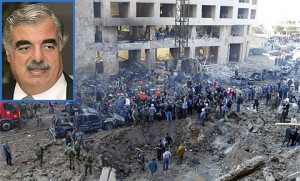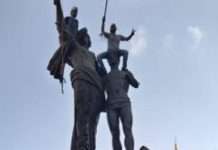Hariri’s killing a catalyst for regional turmoil
Feb. 14, 2015
Hussein Dakroub/The Daily Star
BEIRUT: The 2005 assassination of former Prime Minister Rafik Hariri will go down in the annals of history as a major event that caused an earthquake in the political landscape of Lebanon. It brought about radical changes in the turbulent Middle East region, including unleashing a wave of popular upheavals in some Arab countries and fueling Sunni-Shiite tensions, analysts said Friday.
In addition to his success as a statesman and a business tycoon, spearheading Lebanon’s postwar reconstruction, Hariri is remembered on the 10th anniversary of his assassination, which falls Saturday, as a unique symbol of Sunni moderation and a leader who fought fiercely for Lebanon’s unity and sectarian coexistence. This heavy legacy is upheld by his son, former Prime Minister Saad Hariri.
The Hariri killing was also credited for forcing the Syrian army, under massive local and international pressure, to withdraw from Lebanon, ending nearly three decades of Syria’s domination of its smaller neighbor.
Hariri’s assassination triggered a mass anti-Syria popular uprising in Downtown Beirut in March 2005, known as the Cedar Revolution. The March 14 Alliance, a coalition of parties that takes its name from the uprising, is still struggling for Lebanon’s freedom, sovereignty and independence.
The coalition, led by Hariri’s Future Movement, stands in opposition to the Hezbollah-led March 8 alliance, which draws its name from a counterprotest on March 8, 2005, in Downtown Beirut to thank Syria for its military and political role in Lebanon. Lebanon remains sharply divided politically between the rival pro- and anti-Syrian camps.
“Hariri’s assassination was the beginning of the cyclone that is currently sweeping across the entire region,” Sami Nader, a professor of economics and international relations at the Universite St. Joseph, told The Daily Star. “Hariri’s assassination dealt a major blow to Sunni moderation, disrupted the equilibrium that prevailed in the region between Saudi Arabia and Iran, triggered Sunni-Shiite tensions and set the stage for the rise of Sunni extremism.”
“The absence of moderation has led to the rise of extremism on both sides: on the Iranian side and the Sunni extremist side that has swept the entire region,” said Nader, also the director of the Levant Institute for Strategic Affairs, a Beirut-based think tank. Nader explained that the “cyclone” referred to the popular upheavals that jolted Iraq, Syria, Yemen and Bahrain, caused mainly by the “policy of isolation and marginalization” exercised by the governments in those countries.
“This is in addition to the emergence of militant organizations that do not recognize any of the governments in the Arab region,” he said.
A similar view was echoed by Imad Salamey, political science professor at the Lebanese American University. “Hariri’s assassination represented the first shot in the growing wedge between two different components of Lebanese and Arab societies over the political direction of the region,” Salamey told The Daily Star.
“On the one hand, we have a camp that is represented by Harirism which is pushing for greater liberalization and openness, both economically and politically, expecting development accordingly,” he said. “On the other hand, we have a more conservative camp, represented by the so-called resistance axis – Syria, Iran and Hezbollah – that is rejecting liberalization and pushing for more conservative sectarianism in the region.”
“Hariri represented the liberalization movement. His death dealt a major blow to this liberalization and moderation in the Arab region in favor of Sunni and Shiite extremism,” Salamey added.
Analyst Qassem Qassir said the death of Hariri, killed along with 21 others in a massive car bomb explosion in Downtown Beirut Feb. 14, 2005, was at the root of the radical changes roiling the volatile region. “The assassination of Rafik Hariri came at a crucial time that pushed the region toward radical changes serving both Israel and America. The assassination was in line with a calculated plan to change the shape of the region,” Qassir said.
“The assassination has led to Syria’s retreat from Lebanon, caused an earthquake in Syria, pushed Hezbollah into internal conflicts, implicated Syria and Hezbollah in Hariri’s killing, sparked a fierce political war against Hezbollah’s weapons and triggered an Israeli war on the party in 2006,” said Qassir, an expert on Islamic fundamentalist movements. “The assassination has inflamed Sunni-Shiite tensions in Lebanon and the region,” he added.
Qassir argued that the killing of moderate Hariri was aimed at pushing Lebanon’s Sunnis toward extremism. “A section of the Sunnis in Lebanon and the region no longer considers Israel to be a priority, but Iran and Hezbollah are,” he said. Nader, the USJ professor, said Hariri’s assassination and the 2003 U.S. invasion of Iraq are two important milestones that led to the emergence of Sunni militant movements, most of them linked to Al-Qaeda.
“In addition to Hariri’s assassination and the U.S. invasion of Iraq, the logic of isolation exercised by [former Iraqi Prime Minister Nouri] al-Maliki against the Sunnis in Iraq had created a fertile ground for the rise of militant Sunni movements in the region,” Nader said. Despite the Syrian withdrawal from Lebanon in April 2005, Nader said, “Hezbollah has emerged as a major political player, whose role and policy were not inclusive, but sought to exclude the Sunnis from running the affairs of the state.”
He cited the toppling of Saad Hariri’s national unity government in January 2011 by the Hezbollah-led March 8 coalition and the resistance party’s brief takeover of West Beirut in May 2008 as “a key moment of Sunni frustration and marginalization that fueled Sunni-Shiite tensions.”
“The Sunni marginalization and the logic of isolation exercised in Lebanon by Hezbollah was also practiced by Maliki in Iraq by the same architect,” Nader said, in a clear reference to Iran.
He added that the emergence of extremist Islamist organizations, namely ISIS and the Nusra Front, are posing “a big challenge” to the Hariri movement of Sunni moderation. “These organizations are presenting themselves as an alternative for Sunni moderation.”
“The strength of Rafik Hariri stemmed from the moderation movement he represented. Being the voice of moderation, the man had a broad popular base,” Nader added.
Salamey, the LAU professor, acknowledged that Hariri’s movement of Sunni moderation and liberalization is facing a tough challenge from militant Islamist movements that have flourished with the wave of the “Arab Spring” uprisings that have shaken the region in the past few years, toppling regimes and changing governments in countries, such as in Egypt, Tunisia, Libya, Yemen and Iraq.
“Of course, the moderate and liberal movement represented by Harirism posed a challenge to sectarian extremism, including Sunni, Shiite and Christian,” he said. “All Islamist affiliated movements, both Sunni and Shiite, are at odds with what Harirism represents.” “Moderates in the Middle East are on the defensive, especially the entire question of nationalism and state and nation is in jeopardy, in favor of a new conceptualization of Islamic state and Umma,” Salamey added.
Qassir also said the extremist Sunni groups are putting “a heavy burden” on the Future Movement. “But the ongoing dialogue between the Future Movement and Hezbollah is aimed at facing the wave of religious extremism,” he said. He added that the Future Movement stands to benefit from confronting extremist organizations.
Qassir said the extremist Sunni organizations are doomed. “Sunni extremism is a circumstantial case with no future in the region because most of the Sunni regimes and governments support moderation and oppose religious extremism.”















